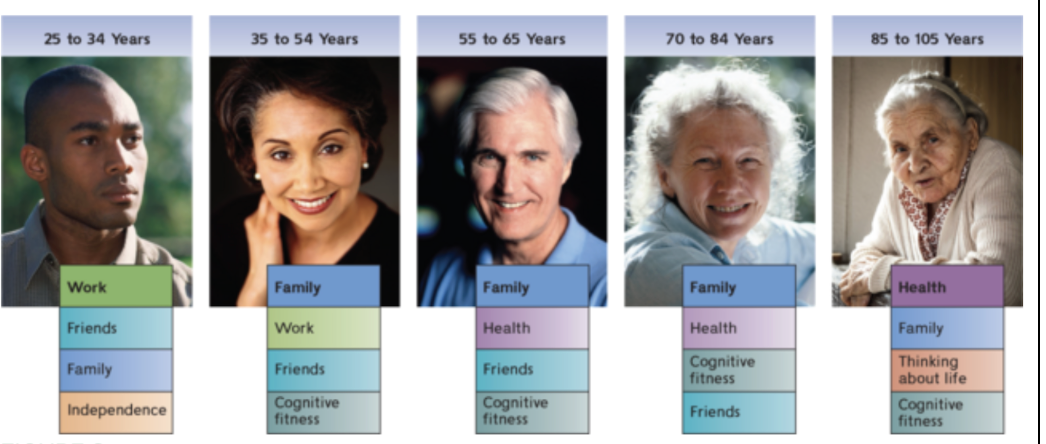Chapter 19: Socioemotional Development in Late Adulthood
1/28
There's no tags or description
Looks like no tags are added yet.
Name | Mastery | Learn | Test | Matching | Spaced | Call with Kai |
|---|
No analytics yet
Send a link to your students to track their progress
29 Terms
Theories of socioemotional development
Erikson’s integrity vs despair
Activity theory
Socioemotional selectivity theory
Selective optimization with compensation theory
Erikson’s Integrity Versus Despair:
Reflecting on the past and either piecing together a positive review or concluding that one’s life has not been well spent
Existential identity; a sense of integrity strong enough to withstand physical disintegration
Integrity
Retrospective glances and reminiscences will reveal a picture of a life well spent, and the older adult will be satisfied
Despair
Retrospective evaluations of the total worth of his or her life might be negative
Life Review
Looking back at one’s life experiences, evaluating them, interpreting them, and often reinterpreting them
Robert Butler’s view
There are chances for pain, anger, guilt, and grief, but there are also opportunities for resolution and celebration, for affirmation and hope, for reconciliation and personal growth
Set in motion by anticipating death
Can include sociocultural dimensions, interpersonal, relationship and personal dimensions
Aspect of life reviews
Look at the positive aspects and regrets
Revive bitterness and negative thoughts
May increase meaning in life
Reminiscence therapy
Discussing past activities and experiences with another individual or group
Higher sense of integrity
Increased self esteem
Life satisfaction
Psychological well being
Activity theory
More active and involved older adults are, the more likely they are to be satisfied with their lives
Continuing middle adulthood roles into late adulthood leads to greater life satisfaction
If not, find substitute roles
Socioemotional selectivity theory
Older adults become more selective about their social networks
Spend more time with individuals with whom they have had rewarding relationships
Being adaptive, spending time with people who matter bc minimizes risks of people they are not close with
Classes of goals
Knowledge related
Emotional related
Knowledge related
Starts relatively high in the early years of life, peaks in adolescence and early adulthood, declines in middle to late
Emotional related
High during infancy and early childhood, deciles from middle childhood to early adulthood then increases in middle to late
When individuals are younger, people are more strongly motivated to pursue information, even at the cost of emotional satisfaction but as they grow old, they are motivated to spend more time pursuing emotional satisfaction
Time is open ended
Strongly motivated to pursue information even at the cost of emotional satisfaction (mind over heart)
Less time left
Motivated to pursue emotional satisfaction
Older adults’ emotions
Fewer highs and lows, more contentment
React less strongly to negative circumstances
Better at ignoring irrelevant information (adaptive)
Remember more positive than negative information
Emotional life of older adults are more positive and less negative
Selective optimization with compensation theory
Successful aging depends on three main factors
Selection
Optimization
Compensation
Selection
Older adults have reduced capacity and loss of functioning, which require a reduction in performance in most life domains
Focus on the most important goal at a particular time
What do you want in life (1-2 major goals commit)
Realize that to reach a goal, you may need to abandon other goals
Optimization
Possible to maintain performance in some areas through continued practice and use of new technologies
Keep working on what you planned until successful
Persevere and keep trying
You may need to be patient until right moment arrives
Compensation
Older adults need to compensate when life tasks require a higher level of capacity
When things don't go the way they used to, find other ways
If things don't go well for you let others help you
When you are not getting results like in the past, find other ways until you do
Paul Baltes
Describe the life of the late Arthur Rubinstein to illustrate their theory: three factors were responsible for his ability to maintain his status as an admired concert pianist into old age
Selection of domains and life priorities is an important aspect of development
Ursula Staudinger’s degree of personal life investment at different points in life
25 to 34 years: work, friends, family, independence
35 to 54 years: family, work, friends, cognitive fitness
55 to 65 years: family, health, friends, cognitive fitness
70 to 85 years: family, health, cognitive fitness, friends
85 to 100 years: health, family, thinking about life, cognitive fitness

Different types of aging
Normal aging
Pathological aging
Successful aging
Normal aging
Their psychological functioning often peaks in early midlife, plateaus until the late fifties to early sixties, then modestly declines through the early eighties, although marked decline often occurs prior to death
Pathological aging
These individuals may have mild cognitive impairment in early old age, develop Alzheimer disease later, or have chronic disease that impairs their daily functioning
Successful aging
Characterizes individuals whose physical, cognitive, and socioemotional development is maintained longer than for most individuals and declines later than for most people
Effects of successful aging
With a proper diet, an active lifestyle, mental stimulation and flexibility, positive coping skills, good social relationships and support, and the absence of disease, many abilities can be maintained or in some cases even improved as we get older
Many abilities can be maintained and or improved in older adults due to
Proper diet
Active lifestyle
Mental stimulation and flexibility
Positive coping skills
Good social relationships
Absence of disease
Being active and engaged are important in successful aging
E.g., exercise regularly, attend meetings and church activities,
Engage in challenging cognitive tasks
Being emotionally selective, optimizing choices
Independent in many aspects of life
Compensating effectively for losses